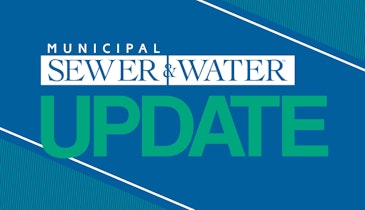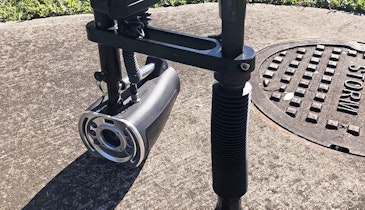Interested in Education/Training?
Get Education/Training articles, news and videos right in your inbox! Sign up now.
Education/Training + Get AlertsWhen Brian Valentino was hired in 2014 as executive director of the Western Monmouth Utilities Authority in New Jersey, he was directed to change the agency’s culture and improve succession planning by emphasizing professional development.
The vehicle for that change has been a program called the Environmental Professional Development Academy, which provides both current managers and up-and-coming employees with roughly 182 hours of instruction across four broad disciplines: administration/leadership, finance, human resources and field operations.
So far, nearly half of the 57 employees at the agency — which is based in the township of Manalapan and provides wastewater-treatment services to more than 125,000 people in central New Jersey — have graduated from the program.
Furthermore, it was quickly expanded statewide through a partnership with about three dozen other environmental utilities and agencies. Overall, 123 employees have graduated from the program, Valentino says.
And above and beyond the 123 graduates, dozens of other employees have taken at least one course but haven’t yet graduated.
“The program has received attention nationally and internationally,” Valentino says, noting that it was recognized in 2019 by the New Jersey One Water awards program, sponsored by the American Water Resources Association’s New Jersey section, the American Water Works Association’s New Jersey section, the Association of Environmental Authorities, the Jersey Water Works and the New Jersey Water Environment Association.
“It’s become kind of the gold standard in New Jersey for developing leadership qualifications for managers and directors at agencies.”
More competent managers
Utilities that struggle with high employee turnover or inadequate succession planning in the face of a looming nationwide wave of retirements should take note of the program’s success. A key benefit: It helps ease the transition for employees who too often get promoted without any management training — a common problem in the industry, Valentino says.
“A lot of managers in our industry are homegrown employees that come up through the ranks,” Valentino says. “They’re either very technical people who often have science-related college degrees or blue-collar employees, such as industrial mechanics, without college degrees.
“Yet they all get promoted into management, usually with no exposure to things such as management training, financial training and human resources law,” he continues.
So Valentino, in conjunction with members of the Association of Environmental Authorities, developed a core curriculum focused on the four areas that he feels are critical to front-line supervisors’ success.
“It’s a crash course,” he explains. “It’s not designed to make them experts in these areas. But it gives them enough exposure to achieve a good baseline of knowledge — teaches them what they need to be good at in order to succeed. If they want, they can get more in-depth training later on.”
Broad knowledge base
For example, a bookkeeper who gets promoted to finance manager first attends the field operations track to get a working knowledge of things like wastewater collections and treatment and drinking water treatment and distribution. Next comes the administrative track, which teaches skills such as leadership principles, strategic planning and how to develop talent.
That’s followed by the finance track, which touches on everything from budgeting basics to capital planning and financing, and the human resources track, which might focus on topics like disciplining employees, collective bargaining and federal family-leave programs.
The EPDA now operates under the auspices of the AEA, with Valentino serving as the program’s director. The program is funded through a $500 fee that each participating agency pays for every employee enrolled, he says.
Program participants attend one day-long session a week for 26 weeks, with roughly six weeks devoted to each of the four tracks. The day’s schedule includes instruction from 9 a.m. to noon, a working, project-oriented lunch and then more classroom instruction from 1 to 4 p.m. The curriculum includes presentations made by expert speakers from various areas and disciplines.
The classes are held at various agencies during each track — except for current classes, which are taught virtually due to the pandemic. But each field-operations class is held at a different utility or agency, Valentino explains.
Qualifying criteria varies
The criteria for admittance to the EPDA varies by agency. At Western Monmouth, for example, employees must submit a letter to Valentino, explaining why they want to participate. Other agencies make program graduation a prerequisite for employee promotions. And yet other utilities hand select which employees they want to attend and groom for management.
“But in no case can employees unilaterally decide to attend,” Valentino notes. “They have to be somehow endorsed by their employer.”
Is there resentment by some employees who want to attend but don’t get selected?
“I honestly have a bigger problem with people who ask to go, get sent and then don’t get promoted,” he says. “People say the program motivated them and gave them great ideas, but now there’s nowhere to use them.
“But I tell them there’s more to being a manager than being a leader and more to being a leader than being a manager,” he adds. “So I try to tab them for special projects that allow them to utilize some of those skills.”
Confidence breeds success
The program yields many benefits. For starters, employees who feel better equipped, more knowledgeable and in control of their careers are more confident and better managers.
“Executives tell us people come back more confident and engaged and that they think more strategically,” he says. “They’re better managers, which is our goal.”
In addition, the program helps employees advance professionally, Valentino says, noting that people who graduate from the program are more likely to get promoted than those who do not.
“People have done very well (career-wise) as a result of this,” he says. “It’s a great social and educational leveler.”
Moreover, surveys show that participants develop relationships and network with fellow attendees after the coursework is completed. “That gives them a pretty broad bench from which to pull for advice and input,” he says.
In addition, the program sends a clear message to all employees: Everyone is a valued professional.
Trickle-down effect
One of Valentino’s proudest moments was the day he overheard an EPDA graduate — an employee in the wastewater collections division who has not yet been promoted — handle a question from a colleague. The frustrated colleague asked why buying some small item required a purchase requisition, as opposed to just running over to a local hardware store and buying it.
The EPDA grad then patiently explained that there are several good reasons for doing so, such as ensuring there’s money in the budget for the purchase and that items are bought from authorized vendors, not a black-market purchase made with an unauthorized vendor.
“I felt like a new father … it was a very profound moment,” he adds. “His answer essentially was chapter and verse the way it should’ve been given. It would’ve come across much differently coming from a boss. But coming from him, it was totally different. He was doing what we call easing the ladder down — sharing knowledge with other employees.”
From a higher-level perspective, Valentino says that too many senior executives in the industry miss opportunities to build great organizational cultures by not looking at the big picture. They concentrate too much on daily operations and ignore the things that can keep their agencies viable long past their departures.
“You can kill an agency quickly through neglect and save it with love and strategy,” he says. “You have to build a culture based on developing individuals and helping them be the best they can be — one where everyone feels important, respected and valued. And if you do that, they’ll do really great work for your ratepayers, which is what we all should strive for.”





